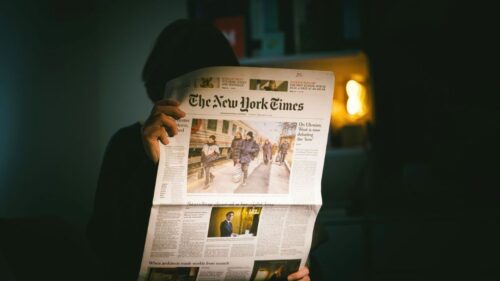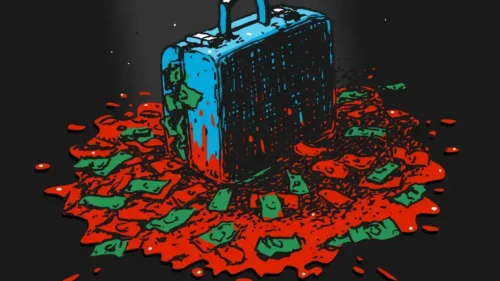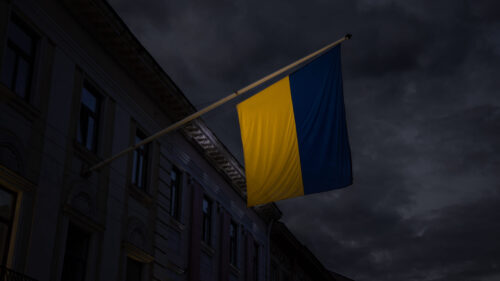Most people in the West and nearly all the mainstream media share their preferred narrative of the Ukraine war. It’s a conflict between Russia, an aggressor existentially committed to aggression and an unsuspecting victim, Ukraine, whose sovereignty was violated without provocation. An alternative narrative, far less popular but impossible to dismiss entirely, states that this has from the start been a proxy war between the United States and Russia. It has served simply to prolong a state of affairs known as the Cold War, that in appearance was paused with the collapse of the Soviet Union in the final decade of the 20th century.
How politicians and journalists account for the relationship between the principal actors — first of all, Ukraine and Russia, but also NATO, the US and the European Union — depends on the individual’s preference for a certain style of standard narrative. One option is the David and Goliath template. This one is complicated by the fact that David (Ukraine) recruited Godzilla (the US and NATO) to join the battle, unless — given the obvious presence of Godzilla — one prefers to think of this as Godzilla vs. King Kong (Russia), with Ukraine simply playing the role of a Hollywood extra squashed by the massive foot of one or the other adversaries.
Another option is Rudyard Kipling’s “East is East and West is West,” where “two strong men stand face to face, tho’ they come from the ends of the earth!” That narrative is a recipe for yet another forever war.
Given the fatigue associated with rooting for one side or the other in the unresolvable conflict, Kipling may already have won the day, which explains why Trump’s 24 hours are long past. The language of the strong man of the West (NATO) seems to bear that out. Ukrainska Pravda, Ukraine’s leading online newspaper reported this recent assessment by Mark Rutte, NATO’s general secretary, of the nature of the Russian threat.
“Rutte believes that Moscow’s current capabilities in space are outdated and not on par with the West: ‘Developing nuclear weapons in space is, therefore, a way for Russia to improve its capabilities. This is a matter of great concern’.”
Today’s Weekly Devil’s Dictionary definition:
Capabilities:
A term used to qualify the level of threat posed by a rival or adversary, which will be systematically underestimated when the purpose of the political rhetoric is to signal the opportunity to prepare for confrontation and overestimated when the purpose is to instill fear, justifying mobilization.
Contextual note
The key idea Rutte is putting forward is contained in the phrase “a matter of great concern.” His logic, or lack thereof, derives from the ambiguity of the meaning of “capabilities.” One should always seek to understand reality and will be justified in feeling concerned about what it turns out to be. In other words, reality, when it proves to be threatening, is a matter of great concern. In that sense, awareness of existing power and capacity to inflict damage on the part of someone one does not trust can always be a matter of great concern.
But capabilities can also suggest some future potential, even though, especially in military parlance, it doesn’t literally mean that. Being capable of developing capabilities is simply not the same thing as possessing capabilities.
So, what is Rutte saying here? First, he proudly asserts that NATO is strong because Russia is weak, given that its “current capabilities in space are outdated.” That should sound reassuring. If he can say Russia’s capabilities are outdated it implies that NATO’s own are up to date. Just as in Zeno’s intriguing (but specious) paradox of Achilles racing a tortoise that was given a significant head start, because Achilles possesses the capability of speed, which the tortoise clearly lacks, it doesn’t matter how many times we divide the diminishing distance between the trailing athlete and the advancing tortoise, Achilles knows he will overtake his competitor and win the race.
Rutte wants us to believe Russia is weak so that NATO, in the role of Achilles, can believe in its strength and speed. Fortified by that knowledge we can boldly plot our course to win the race, confident that we will win. But then Rutte hits a serious snag. If we believe Russia is weak, NATO needn’t spend money to tool up or even have a reason to exist.
To overcome his equally specious paradox, Rutte feels obliged to evoke a future in which Russia may become strong. “We’re aware of reports that Russia is exploring the possibility of deploying nuclear weapons in space.” Does the word “capabilities” have the same meaning, or indeed any meaning when evoking “a future” when Russia “may become strong?”
In short, “capabilities” is a word Humpty Dumpty would undoubtedly cherish, as Lewis Carroll indicates in this quote from his conversation with Alice: “‘When I use a word,’ Humpty Dumpty said in rather a scornful tone, ‘it means just what I choose it to mean – neither more nor less.’” For Rutte, Russia’s real capabilities are weak but its imagined capabilities in the future may perchance be worryingly strong. Any rational person would deem the semantic ambiguity of the NATO chief’s reasoning “a matter of great concern.”
Historical note
NATO was born just over 75 years ago, in the immediate aftermath of World War II. Whether its historical justification was clearly reasoned or not, its creation responded to two perceived goals. The first was to provide a structure that might prevent European nations from behaving in the irresponsible manner that had led to two devastating World Wars. If the stronger nations of Europe could be united militarily and take orders from the strongest nation of all, on the opposite side of the Atlantic, they would find it difficult to go to war amongst themselves.
The second reason was both ideological and financial. It was the fear and loathing of communism. This became the obsessive theme emanating from the US and the United Kingdom. The dominant Anglo-Saxon cultures proved to be exceptional among the concert of nations in one important respect: The sense of identity, as promoted by the governing elite, grew far more significantly from their economic ideology than from their cultural, religious and linguistic traditions. Their leaders suspected the vulnerability of their hyper-competitive ideology that could potentially alienate the subservient castes, including the middle class. They lived in permanent fear of an assault on the undefined but fully functioning system called capitalism, whose architecture and operating manual had been designed and distilled out of the experience of four centuries of European colonialism.
The obvious source of that assault would be their wartime ally, the Soviet Union, whose official ideology challenged the legitimacy of both capitalism and colonialism. Instead of studying the means of achieving some kind of stable relationship based on mutual respect, the Western victors opted for a stance of direct ideological opposition concretized by a military posture. Things could have played out differently, particularly within Europe. But the Anglo elite were right to suppose that their ideology would always be vulnerable due to the inevitable perception of uncontrollable inequality within nominally democratic regimes. The Soviet Union stood as the ideal enemy against whom it made sense to organize militarily.
NATO is not merely a military alliance. It also plays three other vital roles. Most significantly, it exists as a lobby for the armaments industry, with US industry in a dominant and unifying, or rather standardizing, position. Here the key notion is interoperability. The second is NATO’s capacity to offer member states a sense of geographical identity that appears to have more tensile strength than Europe’s national boundaries, the source of so much historical conflict. NATO thus defines an illusory space people feel they safely occupy.
The third non-military role NATO plays is purely psychological. It has to do with the member nations’ sense of being physically connected with one another thanks to a shared military command. This serves to attenuate the effects of their visible cultural diversity and to counter the natural centrifugal force of linguistic and cultural divergence. Because of its technology and supranational organization, NATO allows Europeans to believe in their collective clout as a geopolitical force.
NATO’s role as a lobby reflects and supports the financial superstructure of the Western alliance. It responds directly to the desire not to defend its member nations, but to defend the financial system that underpins it. One may legitimately object that the cultural and psychological force of NATO, creating belief in the group of nations’ muscular force, is fundamentally psychosomatic. Its failure to prove its force in the Ukraine war underlines this point. But belief in one’s “capabilities” has become a fundamental necessity in the competitive world of capitalistic nation states, even when those capabilities only exist in theory.
*[In the age of Oscar Wilde and Mark Twain, another American wit, the journalist Ambrose Bierce produced a series of satirical definitions of commonly used terms, throwing light on their hidden meanings in real discourse. Bierce eventually collected and published them as a book, The Devil’s Dictionary, in 1911. We have shamelessly appropriated his title in the interest of continuing his wholesome pedagogical effort to enlighten generations of readers of the news. Read more of Fair Observer Devil’s Dictionary.]
Lee Thompson-Kolar edited this piece.]
The views expressed in this article are the author’s own and do not necessarily reflect Fair Observer’s editorial policy.
Support Fair Observer
We rely on your support for our independence, diversity and quality.
For more than 10 years, Fair Observer has been free, fair and independent. No billionaire owns us, no advertisers control us. We are a reader-supported nonprofit. Unlike many other publications, we keep our content free for readers regardless of where they live or whether they can afford to pay. We have no paywalls and no ads.
In the post-truth era of fake news, echo chambers and filter bubbles, we publish a plurality of perspectives from around the world. Anyone can publish with us, but everyone goes through a rigorous editorial process. So, you get fact-checked, well-reasoned content instead of noise.
We publish 3,000+ voices from 90+ countries. We also conduct education and training programs
on subjects ranging from digital media and journalism to writing and critical thinking. This
doesn’t come cheap. Servers, editors, trainers and web developers cost
money.
Please consider supporting us on a regular basis as a recurring donor or a
sustaining member.
Will you support FO’s journalism?
We rely on your support for our independence, diversity and quality.








Comment